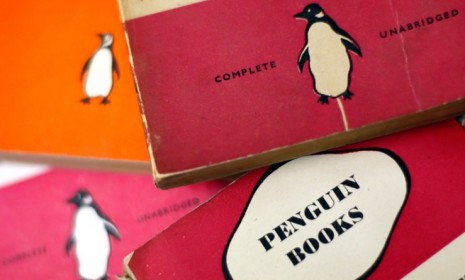The Penguin-Random House merger: 3 takeaways
The new deal will produce the world's largest book publisher, as the industry tries to stave off online retailing giant Amazon

A free daily email with the biggest news stories of the day – and the best features from TheWeek.com
You are now subscribed
Your newsletter sign-up was successful
Penguin and Random House have announced that they will merge to create the world's largest publisher — dubbed Penguin Random House — accounting for about 25 percent of the world's books. The move is seen as a direct response to online behemoth Amazon, whose ruthless price-cutting strategy has cast an ominous shadow over multiple industries. Indeed, some say it's long past time that publishing houses joined forces to buttress their embattled industry, and there were even reports that HarperCollins, a unit of Rupert Murdoch's News Corp., had offered a competing bid for Penguin when rumors of the Penguin-Random House merger first surfaced. Here, three takeaways from the merger:
1. Amazon faces stiffer competition
Joining forces will allow Penguin and Random House to "achieve the sort of scale that will enable them to resist Amazon's inexorable downward pricing pressure on books, especially e-books," says Jeff Bercovici at Forbes. Amazon's super-low prices on traditional books have hobbled brick-and-mortar bookstores (recently sending Borders into bankruptcy), once the main retail venue for publishers. In addition, armed with its popular Kindle e-reader, Amazon has a dominant presence in the growing e-book industry, in which it also benefits from very low prices. By pooling their resources and cutting overlapping costs, Penguin and Random House hope to better compete in the pricing wars.
The Week
Escape your echo chamber. Get the facts behind the news, plus analysis from multiple perspectives.

Sign up for The Week's Free Newsletters
From our morning news briefing to a weekly Good News Newsletter, get the best of The Week delivered directly to your inbox.
From our morning news briefing to a weekly Good News Newsletter, get the best of The Week delivered directly to your inbox.
2. The industry will continue to consolidate
"For now, it gives publishers safety in numbers as they continue to be battered" by Amazon and other online retailers, says Alexander Nazaryan at the New York Daily News. Publishers are already "consolidating around fewer, more powerful chains that are often focused on marketing a handful of top titles," says Eric Pfanner at The New York Times. As long as antitrust regulators don't object, "it is likely that News Corp will seek another suitor for HarperCollins, like Macmillan, Hachette, or Simon & Schuster, the three remaining major publishers," says Jeremy Greenfield at Forbes.
3. The merger is a bad deal for readers
The merger "may stave off the demise of publishing for some time," says Nazaryan, but "it does nothing good for readers and writers." Consolidation will undoubtedly lead to layoffs and fewer book imprints. Marketing budgets will focus more exclusively on big-name authors like John Grisham, while less well-known authors will find it harder to get published. "So let the handwringing begin," says Michael Levin at The Huffington Post. "The collapse of a once-proud industry has taken a giant step forward."
A free daily email with the biggest news stories of the day – and the best features from TheWeek.com
-
 Political cartoons for February 21
Political cartoons for February 21Cartoons Saturday’s political cartoons include consequences, secrets, and more
-
 Crisis in Cuba: a ‘golden opportunity’ for Washington?
Crisis in Cuba: a ‘golden opportunity’ for Washington?Talking Point The Trump administration is applying the pressure, and with Latin America swinging to the right, Havana is becoming more ‘politically isolated’
-
 5 thoroughly redacted cartoons about Pam Bondi protecting predators
5 thoroughly redacted cartoons about Pam Bondi protecting predatorsCartoons Artists take on the real victim, types of protection, and more